Then & Now | Macanese writer-lawyer whose novels and short stories paint a nostalgic picture of 1930s Macau and its people
- Henrique de Senna Fernandes wrote lightly disguised fiction about the lives of his Macanese community and those of Macau’s Chinese residents
- He wrote movingly of mui tsai, girls sold into virtual slavery, and made acute observations about the subtle adaptations of Hong Kong Portuguese to British ways

Macanese writer-lawyer Henrique de Senna Fernandes (1923-2010) left an indelible imprint on Macau’s literary life.
His body of work – mostly autofiction in the form of novels and short stories – gives a compelling flavour of what the then-tiny, left-behind Portuguese settlement on the China coast had looked, smelled, sounded and felt like in the years of his youth and young adulthood.
His writing explores a distinct flavour of life in the interwar years, as observed by a young Macanese man from a long-established local family; by the time of Senna Fernandes’ birth, his family had lived in Macau for more than two centuries.
Points of connection and intersectionality between his Macau, that of the metropolitan Portuguese settler/expatriates, and that of the Chinese population, are recurrent themes.
The Praia Grande, with its timeworn vista of junks and the odyssey of its heroic, adventurous lorcha crews, inspired my early writing
An extended post-war sojourn in Portugal, where he studied law at Coimbra, caused him to discover that his own personal ancestral homeland – the ultimate source of all his creativity – was in fact Macau, not Portugal.

